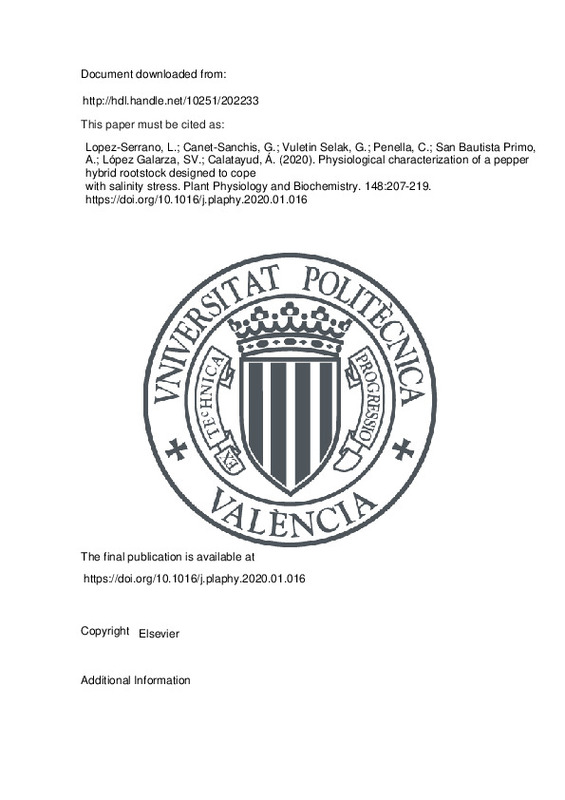JavaScript is disabled for your browser. Some features of this site may not work without it.
Buscar en RiuNet
Listar
Mi cuenta
Estadísticas
Ayuda RiuNet
Admin. UPV
Physiological characterization of a pepper hybrid rootstock designed to cope with salinity stress
Mostrar el registro sencillo del ítem
Ficheros en el ítem
| dc.contributor.author | Lopez-Serrano, Lidia
|
es_ES |
| dc.contributor.author | Canet-Sanchis, Guillermo
|
es_ES |
| dc.contributor.author | Vuletin Selak, Gabriela
|
es_ES |
| dc.contributor.author | Penella, Consuelo
|
es_ES |
| dc.contributor.author | San Bautista Primo, Alberto
|
es_ES |
| dc.contributor.author | López Galarza, Salvador Vicente
|
es_ES |
| dc.contributor.author | Calatayud, Ángeles
|
es_ES |
| dc.date.accessioned | 2024-01-30T19:01:34Z | |
| dc.date.available | 2024-01-30T19:01:34Z | |
| dc.date.issued | 2020-03 | es_ES |
| dc.identifier.issn | 0981-9428 | es_ES |
| dc.identifier.uri | http://hdl.handle.net/10251/202233 | |
| dc.description.abstract | [EN] In pepper crops, rootstocks that tolerate salt stress are not used because available commercial rootstocks offer limited profits. In this context, we obtained the hybrid NIBER®, a new salinity-tolerant rootstock that has been tested under real salinity field conditions for 3 years with 32%¿80% higher yields than ungrafted pepper plants. This study aimed to set up the initial mechanisms involved in the salinity tolerance of grafted pepper plants using NIBER® as a rootstock to study root-shoot behavior, a basic requirement to develop efficient rootstocks. Gas exchange, Na+/K+, antioxidant capacity, nitrate reductase activity, ABA, proline, H2O2, phenols, MDA concentration and biomass were measured in ungrafted plants of cultivar Adige (A), self-grafted (A/A), grafted onto NIBER® (A/N) and reciprocal grafted plants (N/A), all exposed to 0 mM and 70 mM NaCl over a 10-day period. Salinity significantly and quickly decreased photosynthesis, stomatal conductance and nitrate reductase activity, but to lower extent in A/N plants compared to A, A/A and N/A. A/N plants showed decreases in the Na+/K+ ratio, ABA content and lipid peroxidation activity. This oxidative damage alleviation in A/N was probably due to an enhanced H2O2 level that activates antioxidant capacity to cope salinity stress, and acts as a signal molecule rather than a damaging one by contributing a major increase in phenols and, to a lesser extent, in proline concentration. These traits led to a minor impact on biomass in A/N plants under salinity conditions. Only the plants with the NIBER® rootstock controlled the scion by modulating responses to salinity. | es_ES |
| dc.description.sponsorship | This work was financed by INIA (Spain) and Ministerio de Ciencia, Innovacion y Universidades through Project RTA2017-00030-0O2-00 and the European Regional Development Fund (ERDF). L. L-S is a beneficiary of a doctoral fellowship (FPI-INIA). | es_ES |
| dc.language | Inglés | es_ES |
| dc.publisher | Elsevier | es_ES |
| dc.relation.ispartof | Plant Physiology and Biochemistry | es_ES |
| dc.rights | Reconocimiento - No comercial - Sin obra derivada (by-nc-nd) | es_ES |
| dc.subject | Antioxidant capacity | es_ES |
| dc.subject | Graft | es_ES |
| dc.subject | H2O2 | es_ES |
| dc.subject | Pepper | es_ES |
| dc.subject | Photosynthesis | es_ES |
| dc.subject | Rootstock | es_ES |
| dc.subject.classification | PRODUCCION VEGETAL | es_ES |
| dc.title | Physiological characterization of a pepper hybrid rootstock designed to cope with salinity stress | es_ES |
| dc.type | Artículo | es_ES |
| dc.identifier.doi | 10.1016/j.plaphy.2020.01.016 | es_ES |
| dc.relation.projectID | info:eu-repo/grantAgreement/MICINN//RTA2017-00030-C02-00/ | es_ES |
| dc.rights.accessRights | Abierto | es_ES |
| dc.contributor.affiliation | Universitat Politècnica de València. Escuela Técnica Superior de Ingeniería Agronómica y del Medio Natural - Escola Tècnica Superior d'Enginyeria Agronòmica i del Medi Natural | es_ES |
| dc.description.bibliographicCitation | Lopez-Serrano, L.; Canet-Sanchis, G.; Vuletin Selak, G.; Penella, C.; San Bautista Primo, A.; López Galarza, SV.; Calatayud, Á. (2020). Physiological characterization of a pepper hybrid rootstock designed to cope with salinity stress. Plant Physiology and Biochemistry. 148:207-219. https://doi.org/10.1016/j.plaphy.2020.01.016 | es_ES |
| dc.description.accrualMethod | S | es_ES |
| dc.relation.publisherversion | https://doi.org/10.1016/j.plaphy.2020.01.016 | es_ES |
| dc.description.upvformatpinicio | 207 | es_ES |
| dc.description.upvformatpfin | 219 | es_ES |
| dc.type.version | info:eu-repo/semantics/publishedVersion | es_ES |
| dc.description.volume | 148 | es_ES |
| dc.identifier.pmid | 31972389 | es_ES |
| dc.relation.pasarela | S\401601 | es_ES |
| dc.contributor.funder | European Regional Development Fund | es_ES |
| dc.contributor.funder | Ministerio de Ciencia e Innovación | es_ES |
| dc.contributor.funder | Instituto Nacional de Investigación y Tecnología Agraria y Alimentaria | es_ES |







![[Cerrado]](/themes/UPV/images/candado.png)

